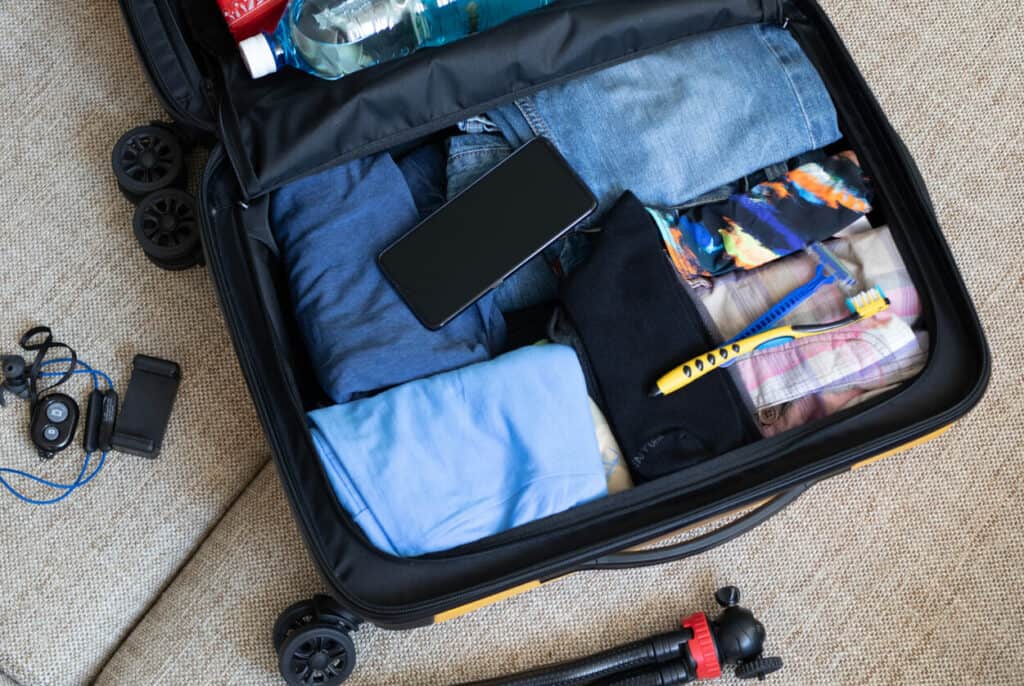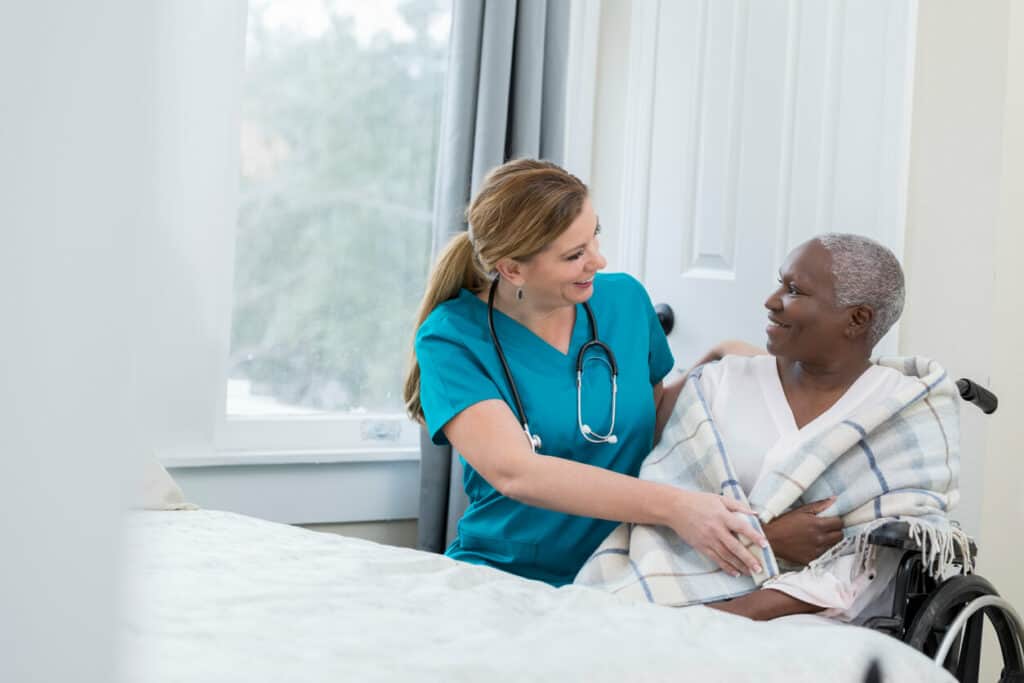
Thank goodness you don’t have a medical emergency or scheduled surgery today. Why even think about the hospital? Mom always said, “you hope for the best and plan for the worst.” Now as you take care of mom, you need to be ready.
The reality of caring for an elderly loved one is that at some point in 2023, you just might take a trip to the hospital – either planned or emergency.
According to the Agency for Healthcare Research and Quality, the average hospital stay is around 4.5 days. Overview of Hospital Stays in the United States, 2012 But regardless of how long you stay, any amount of time away from a familiar home environment can be upsetting to someone with memory problems. Packing the best hospital bag for your visit can reduce some of the hospital stay stress. This helps the patient feel more at ease and have a better mindset to heal and accept care.
So, grab a pen and paper and start thinking about the TYPES of ITEMS you need to bring to the hospital. Your list will likely include the following:
Breaking your bag items into categories will help you gather what you need.
Having a hospital overnight bag packed and ready to go allows you to place your attention on the medical concerns of your loved one without the distraction of worrying whether or not you have everything in your bag.

1. Paperwork and Documents
Even in an emergency, hospitals need the proper documents to get your loved one checked in for treatment. It is vital to have the correct records in hand at the initial registration, so you aren’t delayed in getting the care your family member needs. You want the focus of the hospital stay to be on the health and well-being of your loved one and not on trying to find the right document.
Required documents may include the following:
- Photo ID
- Insurance card, Medicare information
- List of medications: prescription and over-the-counter
- Current medical records of treatment
- Emergency contact information
Common questions when you check in at the hospital will focus on confirming the patient’s identity, the type of insurance coverage they have, and Emergency contact information. Some hospitals will also ask for a list of current medications, both over-the-counter and prescription, during the initial patient registration.
Hospitals also may ask for a copy of your Advanced Directive, Living Will, or Power of Attorney documents. You can add the Power of Attorney and Advance Directive documents to a patient’s permanent record at the hospital for future reference.
2. Medications and Medical History
Any in-depth medical information you can share with your care team will help them provide better care for your loved ones. If you are coming to the hospital with an emergency, your attention is hyper-focused on that immediate crisis. We often forget past experiences or important information when faced with an emergency.
A prewritten medical history is easy to hand to a doctor in seconds and will give a more accurate health picture to use in treatment. Relying on your memory in an emergency can leave room for error and misjudgment, so it’s always a good idea to have a pre-written medical history ready.
Remember to bring any records to the hospital needed for current treatment, such as imaging disks or x-rays. Often imaging services are separate from the hospital you are scheduled to go to for treatment. You might need to provide copies of your imaging results to the hospital staff prior to treatment.
Other needed medical information may include:
- Allergies to medications
- Allergies to foods
- Previous surgeries
- Previous injuries
- Current health issues other than the one being treated
- Relevant family medical history
What Medications to bring to the Hospital
When a loved one is on a regular medication routine, you may be tempted to pack these prescriptions in the hospital bag. Communicate with your doctor about what is best for you or your loved one during a hospital stay. Some hospitals have policies that do not allow you to take personal medication without specific direction from your doctor.
Unless you have been told by your doctor to bring medicines with you to the hospital, you should leave all personal medications at home and instead bring a comprehensive list of the drugs your loved one takes with the dosage amounts.

3. Patient Bag
It is important to remember that each patient’s needs may vary along with each hospital’s policies. So be sure to check with your healthcare provider or hospital for any specific guidelines or recommendations for what you can bring to the hospital with you.
Essentials
Most hospitals provide patients with gowns and basic toiletry needs. But we all know that hospitals are not 5-star hotels. You can pack a few small personal essentials to help with your loved one’s comfort. Depending on how long your stay will be, you can pack personal toiletry items but avoid products that have perfumes.
Your loved one may feel more comfortable in their own clothes. When packing clothes from home, choose clothing that is loose and easy to move in. A cozy set of pajamas can feel comforting in the cooler temperatures of a hospital room.
A few items not to forget might be:
1. Slippers
2. Underwear
3. Extra socks
4. Bathrobe
5. Phone charger
6. Shower cap
7. Toothbrush
8. Hairbrush
9. Denture trays
Remember to bring glasses, hearing aids with extra batteries, or C-pap machines. You can check with your hospital staff if you need to bring your own walker or cane if your loved one needs mobility help. Often, a patient with memory loss issues will feel calmer with the items they are used to having, even if the hospital can provide equipment during their stay.

Extras
Being in a hospital can be scary for anyone. Now add to normal hospital anxieties the confusion that comes with dementia or Alzheimer’s. Having some personal items can help your loved one feel more comfortable and reduce stress.
Helpful items could be anything that brings your loved one a sense of familiarity. This might include:
- A favorite book
- An extra soft blanket
- A small picture of family members
- Fidget toy or baby worry blanket
Just like animal therapy, a small stuffed animal can be comforting to hold. Remember that the blankets and pillows you bring can get stained. Don’t bring anything that is valuable or irreplaceable. The goal is simply to create a calm environment for your loved one so they can focus on regaining their health.
If your stay is for several days or longer, consider bringing additional entertainment items your loved one enjoys, like:
- electronic devices with charging cords
- playing cards or dominos
- knitting
- reading materials
You know your loved one better than anyone else. And your goal is to help your senior be as comfortable as possible. Quiet entertainment, peaceful music, or familiar distractions can take the focus off hospital noises and create a more restful environment that promotes health and healing.
4. Caregiver Bag
Probably one of the most important things to bring to the hospital is YOU. You are the most important advocate and comforting element contributing to the well-being of your loved one.
Patients suffering from memory loss issues need to have their family and caregivers with them as they try to navigate a hospital stay. They need reassurance. They need repeated explanations of what is happening.
Before you say you have everything for your loved one, make sure you have a bag ready for yourself.
Some ideas for items you will need are:
- Your medications
- Chargers for electronic devices
- Clean socks
- Slippers
- A jacket or blanket
- A book
- Snacks
- Water bottle
As a caregiver, you often overlook yourself in situations like this. It is important to remember that when your needs are taken care of, you can make more sound judgments and provide better care for your loved one. You will be the most familiar face in the hospital room.

Summary
Your hospital overnight bag doesn’t need to carry the kitchen sink. Planning your bag when you are not in a time crunch or emergency allows you to plan the handful of items that will give the most comfort to your loved one.
Family members can also bring items later if needed, so don’t stress too much over what you should pack when it comes to personal items.
It is always a good idea to check your doctor and local hospital to learn if there are any hospital policies you need to know about as a senior caregiver in deciding what to bring to the hospital.
As we move further away from hospital restrictions, it is important to check on any COVID-19 restrictions. Check with your local hospital to learn if there are specific policies that are COVID-19 related, such as having a caregiver stay with a loved one with memory problems.
Packing an overnight bag is easy when you follow a few simple steps.
- Consider the needs of your loved one
- Gather needed documents
- Pack the essentials
- Pack a few extra comforts
- Pack the Caregiver’s bag
An overnight bag for hospital stays with memory care patients requires careful consideration of privacy and comfort. A well-stocked overnight bag can help provide support for both the patient and their caregiver during a hospital stay. It’s important to pack items such as a toothbrush and toothpaste, shampoo, and deodorant, along with other toiletries that will make the stay more comfortable. Don’t forget to include a cozy robe, a pillow, and any familiar items that will provide comfort and help maintain a sense of normalcy, such as a favorite blanket.
In addition to the usual overnight bag essentials, it’s also important to be aware of the hospital’s privacy policy and conditions. Caregivers should communicate with the hospital staff about the patient’s specific needs and routines, and discuss any necessary accommodations.
Before the hospital stay, it’s also important to sign up for email or app alerts to receive updates and resources that can support the memory care patient’s comfort and well-being. Caregivers should also have a checklist of the patient’s daily routines and activities to help maintain a sense of normalcy and provide comfort during the hospital stay. With a well-stocked overnight bag and a little preparation, caregivers can help support their loved ones during a big day and provide comfort during a time of stress.
Now whether you have a planned visit to the hospital or an unexpected emergency, You’re ready to go! Amy’s Eden is always concerned about the comfort and care of your loved one. Our professional staff will help you gather, prepare, and pack your emergency overnight back so have peace of mind.
Amy’s Eden supports your continual efforts to take care of your loved one in any situation. Deep breath, you got this!
https://www.hcup-us.ahrq.gov/reports/statbriefs/sb180-Hospitalizations-United-States-2012.pdf




